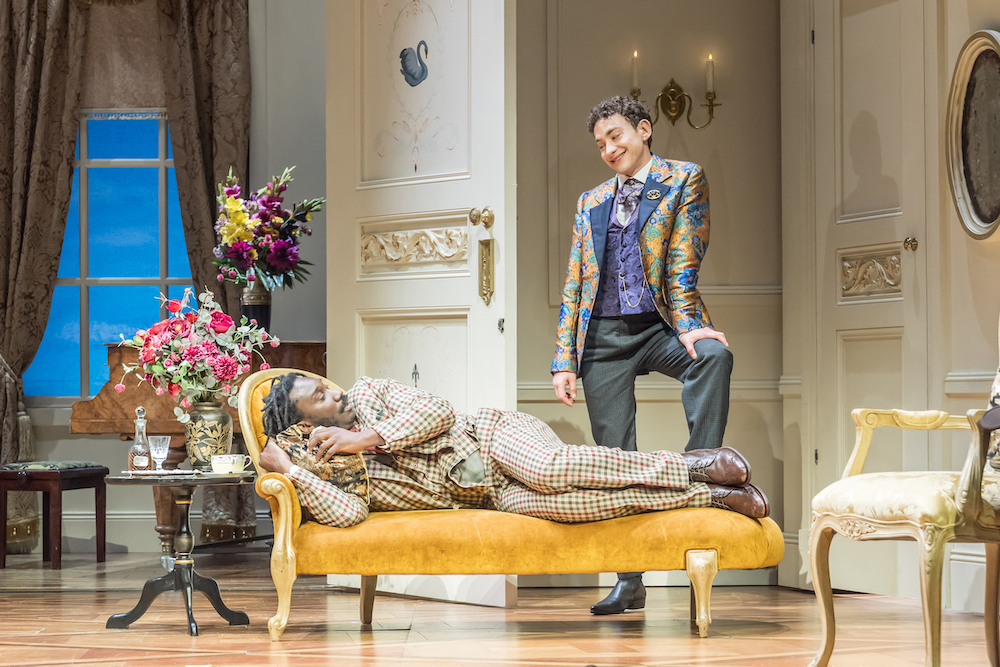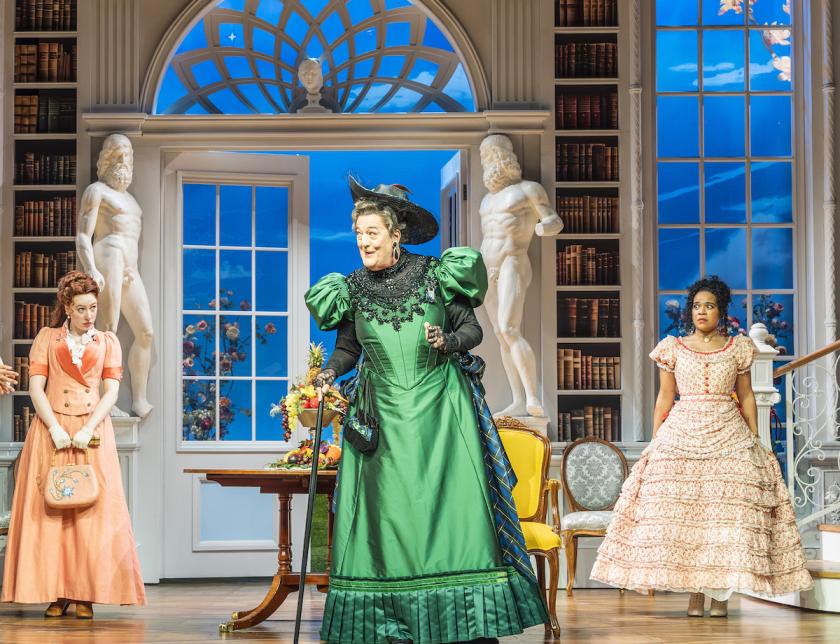Star casting has, since the pandemic, done much to restore the fortunes of commercial theatre. And, when they can pull off a similar deal, the same applies to subsidised venues. If the downside is that many smaller institutions get left behind, the upside is clearly visible all over the West End.
The latest stars to join Alicia Vikander and Andrew Lincoln in The Lady from the Sea or Brendan Gleeson in The Weir, are national treasures Stephen Fry and Olly Alexander in this West End transfer of the hit National Theatre revival of Oscar Wilde’s 1895 masterpiece, The Importance of Being Earnest. Despite some controversy about casting Fry as Lady “a hand baaag” Bracknell, depriving many older actresses of the part, this revival offers an evening of stupendous fun. And Fry, soon to appear on the BBC’s Celebrity Traitors, is one of the best things in it.
The play opens in the fashionable London flat of Algernon Moncrieff (Alexander), as he discusses the love life of his friend Ernest Worthing, who wants to propose to Algie’s cousin, Gwendolen Fairfax. In the course of their conversation, it emerges that Earnest is living a double life: in the countryside he goes by his real name of Jack, playing the part of a serious adult to impress his young ward, the heiress Cecily Cardew, while enjoying himself as a naughty “Earnest” in town. Algernon admits he does something similar, having invented a sickly friend called Bunbury – who he can visit whenever he needs to leave any boring social occasions.
When Gwendolen and her overwhelmingly formidable mother, Lady Bracknell (Fry in excellent form), visit Algernon, the plot twists and twirls as Gwendolen claims, to Jack’s dismay, that she can only love a man called Earnest. As the action moves to the countryside, Cecily is being tutored by Miss Prism, and is attracted to Algernon, who arrives pretending to be Jack’s brother Earnest. As the two men plan to be rechristened “Earnest” by local rector Dr Chasuble, new arrivals include not only Gwendolen, but also Lady Bracknell. Soon the latter is investigating the suitability of both men to marry, and the secret of Jack’s orphaned past is revealed in a hilarious denouement which wonderfully displays Wilde’s imaginatively wild wit.  Subtitled “A Trivial Comedy for Serious People”, The Importance of Being Earnest is arguably the greatest laugh-fest in the English language, a dazzlingly subversive entertainment and the most frequently revived play from the Victorian era. Wilde’s linguistic virtuosity is based on the comedy of unexpected inversions, such as “All women become like their mothers. That is their tragedy. No man does, and that is his.” Or the beautifully frivolous: “I hope you have not been leading a double life, pretending to be wicked and being good all the time. That would be hypocrisy.” Comments such as Bracknell’s “To lose one parent may be regarded as a misfortune; to lose both looks like carelessness” are now compulsively quotable.
Subtitled “A Trivial Comedy for Serious People”, The Importance of Being Earnest is arguably the greatest laugh-fest in the English language, a dazzlingly subversive entertainment and the most frequently revived play from the Victorian era. Wilde’s linguistic virtuosity is based on the comedy of unexpected inversions, such as “All women become like their mothers. That is their tragedy. No man does, and that is his.” Or the beautifully frivolous: “I hope you have not been leading a double life, pretending to be wicked and being good all the time. That would be hypocrisy.” Comments such as Bracknell’s “To lose one parent may be regarded as a misfortune; to lose both looks like carelessness” are now compulsively quotable.
Wilde’s satire is liberatory because it plays theatrical games with notions of respectable appearances, and this whole world is almost entirely constructed by means of words, creating a surreal universe where insistent paradoxes show how all reality, and all values, are artificial. In this highly hothouse context, Wilde questions all binary oppositions: between tragedy and comedy, between profundity and superficiality, between truth and lies. And, queerly, between male and female. In this stage world being a man or a woman is clearly based on your ability to perform this role, as well as having a secret life outside of respectable society.
Max Webster’s effusively queer production, which opened last year with a cast that included Sharon D Clarke as Bracknell and Ncuti Gatwa as Algernon, is brightly designed by Rae Smith, with costumes that are simply, breath-takingly magnificent, and starts off as a joyful, flashy and exuberant reimagining of the play. As the curtain, which is graced with an old capacious handbag and overhung with a suitably ludicrous rotten-vegetable bouquet, rises, Alexander appears in delightful drag, pounding a grand piano. Wow! The show’s got off to a dazzlingly, a dizzying and hilariously crowd-pleasing start before a single word is uttered.
After Alexander changes into more everyday garb, and chats with Nathan Stewart-Jarrett’s Jack in an energisingly queer-ish meeting, the arrival of Fry’s Lady Bracknell promises to be the next delightful moment. And it certainly is. What’s brilliant about Fry’s performance here and in the rest of the evening, is that he plays his imposing character straight (pun intended). As well as being magnificently attired and bewigged, he speaks his lines seriously and forcefully, resisting the temptation to trill, or tremolo or exaggerate. Letting Wilde’s exceptionally rib-tickling words (surely the template for all dowagers since, including Maggie Smith’s Countess of Grantham) do all the work is not only highly amusing, but also contrasts beautifully with the verbal acrobatics of the rest of the cast.
As Fry – who’s played Wilde on film and is well worth the price of your ticket – towers over them, It’s A Sin star Alexander and Misfits’ Stewart-Jarrett play the flamboyant Algernon and nervy Jack (pictured above) in a production which can never be accused of excessive subtlety. If you like your Wilde to be queer as fuck, then – believe – this is your gig. This reading of the play, which Webster has staged in a fuller-than-usual version at almost three hours long, raises questions about the credibility of this version of bi-sexuality and sexual fluidity. But who cares? Just as long as the performances are hysterically OTT, nothing else matters.
With the appearance of the women, Kitty Hawthorne (Gwendolen) and Jessica Whitehurst (Cecily), the focus of the acting tightens a bit, although their same-sex interactions and some vulgar suggestiveness likewise is frankly inexplicable. In this version of hip-hop Wilde, Gwendolen fans her fanny and achieves an orgasm, while Cecily loves her dance moves. Hugh Dennis (Chasuble) and Shobna Gulati (Prism) lend their minor characters a kind of comic integrity, but the real showstopper is Told by an Idiot’s Hayley Carmichael, who turns the manservants into laugh-aloud comedic idols, at one point using a pair of knickers in what is surely a nod to Joe Orton’s What the Butler Saw.
Other nods are made to Bridgerton, Snoop Dogg and a queer London venue, and the comedy powers along, with only a few slack moments (as when Alexander and Stewart-Jarrett have tea). The sheer energy and visual delights of this vision of queer Victoriana, dragged voguing and squawking into our current century might not be enough to blow away all doubts about the piece (exceptional exuberance can get tiring quite quickly) but it is certainly entertaining – and then some. By the time the supremely colourful curtain call arrives, the audience is worshipping at Webster’s feet. Shamelessly populist and wonderfully absurd.















Add comment